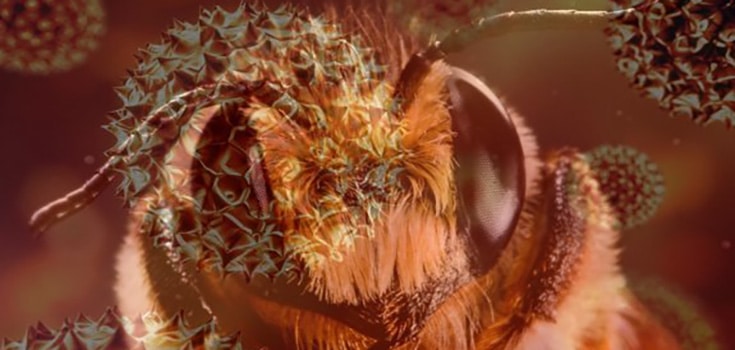Study: Bee Venom Found to Destroy HIV (Human Immunodeficiency Virus)

More than 34 million people worldwide are living with the human immunodeficiency virus (HIV), but research recently conducted at the Washington University School of Medicine in St. Louis has shown that bee venom, and its main active component, melittin, carried via nanoparticles, is able to destroy unhealthy cells and tumors caused by viruses like HIV.
Melittin is a potent toxin in bee venom, which can poke holes in the protective envelope which surrounds HIV, as well as numerous other viruses. Thankfully and surprisingly, this toxin doesn’t harm healthy cells, only the ones infected with the virus.
While some might argue that AIDS is not caused by HIV, it seems particularly odd that bee venom so effectively treats the HIV virus. HIV is contracted by more than 3 million people under the age of 15 almost every year, so even if the virus doesn’t cause AIDS, it definitely doesn’t lead to our perfected health.
“If there is evidence that HIV causes AIDS, there should be scientific documents which either singly or collectively demonstrate that fact, at least with a high probability. There is no such document.”- Dr. Kary Mullis, Biochemist, 1993 Nobel Prize for Chemistry.
All of this would be great news, except that bee populations are being wiped out at staggering rates in almost every country around the world. Bee colonies are disappearing so fast that the fertilization of major crops through pollination is considered a world-wide concern. Have you heard of the 37 million dead bees in Ontario, Canada after a GMO corn field planting? Yeah…
Furthermore, as evidenced in the recent seizure of Terence Ingram’s bees that were resistant to Monsanto’s chemicals, and more than 30 years of his bee research was destroyed, we can hardly look at what other benefits, aside from crop pollination, and the conquering of the HIV virus that bees might offer us. In the meantime, here are five ways you can help the bees and stop colony collapse disorder:
- 1. Plant things organically that bees like. Clover is a good one, as well as sage, oregano, lavender, alfalfa, honeywort, dragonhead, and echinacea.
- 2. Provide a bee a home by building a habitat. There are numerous DIY projects you can find about how to make a house for bees.
- 3. Protect your garden from pests organically instead of using pesticides. You can find organic gardening tips here at NaturalSociety by using our search function, or you can find numerous organic gardening tips all over the Internet.
- 4. Let your vegetables go to seed after you harvest, called ‘bolting’. Bees like this.
- 5. Support local bee keepers by buying organic honey and stay away from the fake stuff being imported from elsewhere, likely found on your grocery store shelves. You can find your local bee keeper at Friends of Honey Bees.
Additional Sources:

How can bee venon "destroy" a retrovirus that has never been documented to exist?
Can anyone show me an electron micrograph of the "HIV virus?" I have never seen it published, only fragments of material in laboratory tests that "infer" a retrovirus. That is not proof of anything.
If it has not been proven to exist, then the entire "HIV causes AIDS" paradigm is completely false, which Kerry Mullins, Peter Duesenburg and others have been arguing for years.
If you have proof that HIV exists, please refer me to the exact published reference.
Randy Ice PT, CCS
what the crazy style of article with lot of links?
Very interesting article!
To find bee venom just google: apitoxin medical grade and you will find it.
Apitoxin is the Latin name for bee venom.
The main ingredient of bee venom is a peptide called melittin that is the capable of killing the HIV-virus.